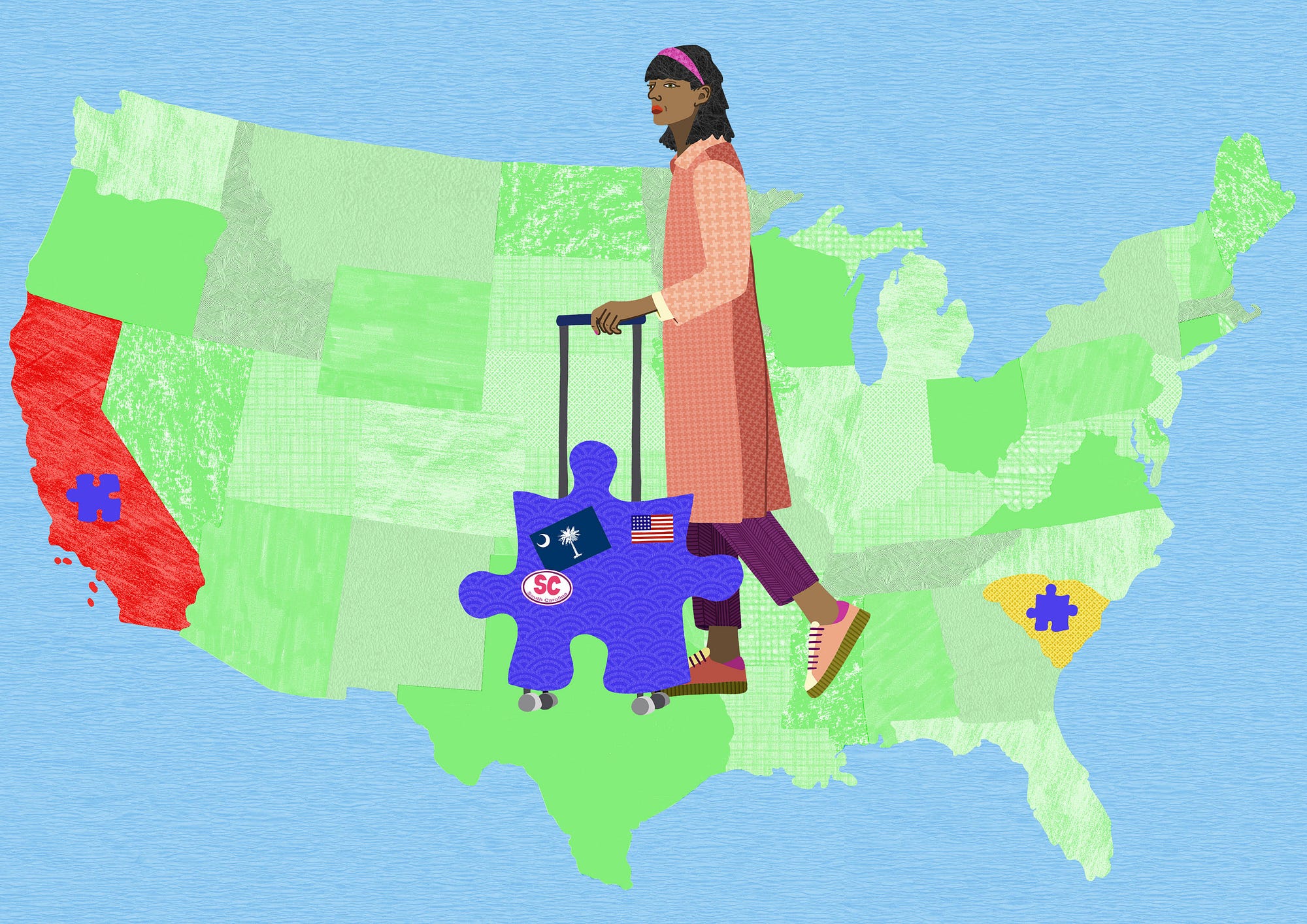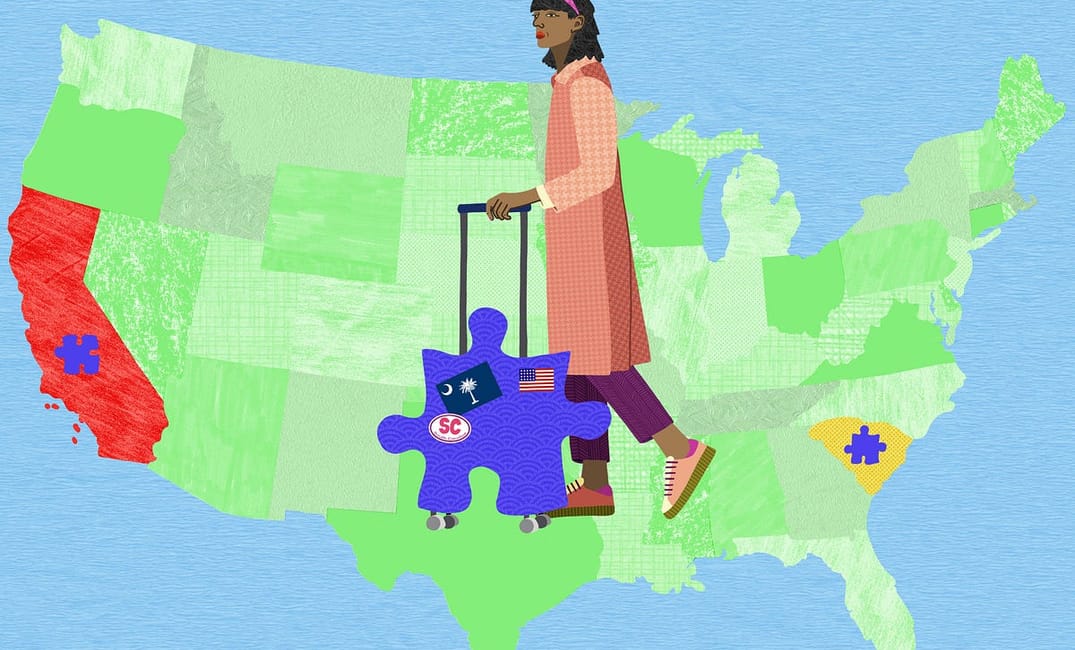
People here often get weird when I reveal that my home state is South Carolina, almost like they have an unconscious fear of American southerners and what bigoted things might come out of our mouths that they’ll have to deal with. Well, guess what, Bay Area—the South is scared of you too.
While growing up in the Carolinas, I heard a lot of “horror” stories about life on the other side of the country—most that Californians have probably heard many times over: a bunch of free-lovin’ hippies, freeloading surfer dudes smoking weed on the streets and “gay parades and compost bins and tacos on every corner”—a word-for-word warning I got from an older gentleman who once bagged my groceries at Publix. (Yes, plastic bags are still free and plentiful in South Carolina, and chatty baggers and Publix are southern delights.)
I didn’t just move to the liberal Bay Area; I dropped myself smack-dab into the most stereotypical hippie house in South Berkeley that a South Carolinian could conjure up.
Despite what everyone said, to a double minority like myself — my parents are Muslims of Indian descent — California sounded like a dream: a progressive, socially diverse, inclusive utopia. When a close POC friend of mine who was born and raised in Oakland encouraged me to move, I decided to become another Bay Area transplant sight unseen.
But I didn’t just move to the liberal Bay Area; I dropped myself smack-dab into the most stereotypical hippie house in South Berkeley that a South Carolinian could conjure up. My first six months in the East Bay proved that Publix grocery bagger right in many ways.
I quickly met, and resided with, a bunch of free-lovin’ hippies: my landlord’s daughter (a polyamorous part-time clown) and her life partner (who lived in a horse trailer in the backyard), plus the son, who lived in a school bus parked outside the house. I got invites to CouchSurfing parties with designated rooms for “cuddle puddles.” Smoking weed on the streets became any Saturday in Dolores Park. As for the freeloading surfer dudes, what is a tech bro if not the modern equivalent of this, really?
In my southern suburban town, if you’re anything but a white, cis, straight Christian person, you’re a token. There I had learned to tokenize myself and others to create quick connections and camaraderie.
Our spot in Berkeley was a haven for LGBTQIA+ folks, and I admired that about it, but I also quickly came to feel that I didn’t fit in. I didn’t understand why my talented rapper of a roommate, a queer indigenous woman, was cold to my charming, Southern-trained niceness. I couldn’t quite figure out why I wasn’t clicking with my landlords—a welcoming, eccentric couple who had a full-on wake for their artist co-op when its building was bought by Twitter. And even though their daughter and her life partner were perfectly kind to me, no true friendship sprung forth.
In my southern suburban town, if you’re anything but a white, cis, straight Christian person, you’re a token. There I had learned to tokenize myself and others to create quick connections and camaraderie. In the Bay, I was still trying to do that, and it showed in how I thought about my roommates. But I was no longer the only Indian or Muslim in the room; I was certainly no longer the most left politically for miles. In my new, tentative friend groups, there were so many converging identities that a cis, white, straight Christian had become quite rare. In fact, even though I’d lived on three other continents, I was suddenly facing ideas and lifestyles that I’d never witnessed outside my computer screen.
Wasn’t it the breath of fresh air my stigmatized self had been craving all along?
As excited as I was to move to the Bay to live among diverse communities, I quickly learned that I had no idea or framework for how to be a radical, progressive anything.
I mean, the difference between South Carolina and the East Bay cannot be better expressed than in how people react when you tell them your weekend plans are to attend an Eid picnic for Totally Radical Muslims (a group for Muslims who are fundamentally leftist, not fundamentalists). But being Muslim and POC, especially one from a model minority group like us Indians, doesn’t automatically make you well-versed in how to live a radical life. As excited as I was to move to the Bay to live among diverse communities, I quickly learned that I had no idea or framework for how to be a radical, progressive anything.
For example, a few of my roommate’s friends were hanging out after dinner when one of them announced she’d just had her gender-reassignment surgery. A cis woman in the group excitedly asked if she could “see her new pussy.” Frozen, I didn’t know how to react. The question made me uncomfortable and embarrassed for the woman who had asked it, but it turns out that there was an expectation that the new pussy would be fawned over. I wanted our guest to feel welcome and her body respected, but I felt like my approach of quiet acceptance just came across as rigid. After all, I was the southern Indian Muslim in the room, wasn’t I? Or was the fact that I was even thinking that a problem in and of itself?
It dawned on me much later that although I may consider myself “open-minded,” I had no experience navigating queer-centric conversations and places, and I realized I was just taking up space in this household. As a brown Muslim from South Carolina, I’ve certainly lived through my unfair share of not fitting in. But this was different. Here was a safe space that I had infiltrated with my cis, straight-centric mindset, and I hadn’t learned how to step out of it.
I had come to the Bay seeking a progressive community to grow and learn from. What I hadn’t expected was having to reconcile my own lack of experience and how that would affect those very communities.
A friend reminded me: for safety and peace of mind, transgender folks assume you are transphobic unless you prove otherwise. It’s why my layers of conservative were the wrong fabric for this sunny Berkeley home. Here I was, a proud Muslim, a proud Indian, a proud southerner — three communities that have historically marginalized the rights of the very people I was living with. What was I doing to prove that I was different? Certainly, there were cis straight folks around me who were doing it right.
But besides a handful of friends, I had no one but the internet to advise me. My crew back in South Carolina were as clueless as I was, and my Indian Muslim dad was still cautioning me about the Castro district. I’d had queer friends and roommates only in cities where it was not safe to be totally out or where they were in the minority at home.
I had come to the Bay seeking a progressive community to grow and learn from. What I hadn’t expected was having to reconcile my own lack of experience and how that would affect those very communities. Besides my needing to put in more work, this six-month Berkeley sublet taught me something important: some spaces aren’t for you — and hey, that’s OK.







